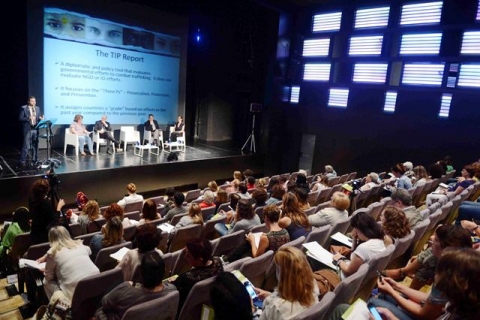The infringement of rights through sexual exploitation is discussed at Metropolis Women symposium
The Metropolis Women International Network organized last Friday (June 13th), for the second time in Barcelona, a symposium that posits the inequality of women as the center of debate. The event revolved around the topic of “Safety and Protection of the Victims of Sexual Exploitation: New Forms of Slavery and its Local Impact”, and counted on the participation of representatives from the METROPOLIS members of Abidjan, Amman, Bamako, Brussels, and the Metropolitan Area of Barcelona, who discussed how to bring safety and protection to victims of sexual exploitation in urban areas.
Sexual exploitation in the worldWomen and girls are the main victims of sexual exploitation, the most profitable criminal activity after arms and drug trafficking.The UN Global Report on Trafficking in Persons reported 55,000 victims in 2012. However, this is just the tip of the iceberg, as the figure only refers to official data. |
The event was supported by Barcelona City Council, Barcelona Provincial Council, the Barcelona Metropolitan Area and the Government of Catalonia through the Catalan Institute for Women. The conference was opened with a few words of welcome and support from the METROPOLIS president, Mr. Jean-Paul Huchon. The audience, composed of almost 200 people, also counted on the participation of representatives of the United Nations, local civil society organizations and authorities from the USA.
“Our responsibility as administrations, organizations, entities, and, above all, as citizens is to put all of our efforts and capabilities into fighting what is known as 21st century slavery,” said Francina Vila, Councillor for Women and Civil Rights of the City of Barcelona and President of the Metropolis Women International Network. “We must be capable of generating public debate about how to respond to the infringement of the basic rights that the victims of sexual exploitation suffer from”, she added.
The purpose of the symposium was to contextualize the issue of women and girls trafficking internationally and within countries, and to discuss ways to protect victims in our cities with different stakeholders that work at the local level in various countries.
Main conclusions of the symposiumSexual exploitation is an expression of inequality between men and women and is related to unequal power structures with regard to women.
Sexual violence must be cut off at the bud by focusing on the situations of extreme vulnerability of girls and boys in different societies in order to prevent them falling into criminal networks.It is necessary to center the debate from the victim’s viewpoint, without criminalizing her.More resources are needed at both the economic and legal levels to identify and care for victims. |
The event enabled a discussion of the topic from different approaches, both from a global perspective and a more local, municipal and metropolitan dimension. This wealth of viewpoints made it possible to conclude that while “90% of cases of sexual exploitation are linked to international organizations” (Xavier Cortès), “trafficking does not have to be international but is also commonplace within a country” (Mark Mineo).
The great complexity that the fight against sexual exploitation represents was present during the different roundtable discussions, which focused among other aspects on the “slowness of police and judicial institutions to adapt to the immense agility and capacity for movement of criminal structures” (Ricardo Salas) and, as it is a global phenomenon, the “need to create a comprehensive law that prevents a heterogeneous approach to the concepts involved” (Adriana Ribas).
Parallel to the discussion, the event included a solidarity coffee break provided by the Catalan Association for Integration and Human Development (ACIDH), an organization which works to improve the quality of life of the intellectually impaired by providing them with comprehensive care.
The symposium allowed the Metropolis Women International Network to offer menus to ACIDH’s four care homes in Barcelona and the “Support Autonomy at Home” project, which involves adapting houses to the conditions of the intellectually impaired.
